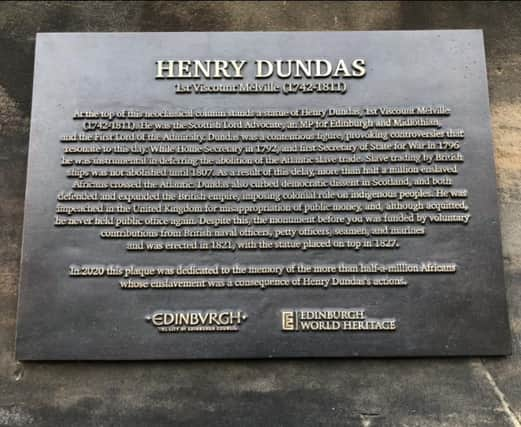‘The voice of the people has been heard’ – human rights campaigner Sir Geoff Palmer hails new Edinburgh slavery plaque


A permanent metal plaque is now installed on the Henry Dundas Melville monument in the heart of the new town, which denounces Dundas’ role in deferring the abolition of the Atlantic slave trade and his part in expanding the British Empire.
Human rights campaigner Sir Geoff said the plaque is a significant achievement that marked the importance of people’s voices being heard.
Advertisement
Hide AdAdvertisement
Hide AdThe plaque on the Category A-listed monument in St Andrew Square is now dedicated to the memory of half a million Africans enslaved as a consequence of Dundas’ actions.
Sir Geoff, who first pushed for a plaque giving a ‘truthful’ account of history on the monument two years ago, has urged people to come forward and have their say in a consultation which could see other features in the city with links to slavery reinterpreted or removed.
Now Chancellor of Heriot-Watt University, Sir Geoff has argued that adding clarifications to these monuments, rather than pulling them down altogether, would avoid erasing history out of ‘guilt’.
Chaired by Sir Geoff, the Edinburgh Slavery and Colonialism Legacy Review group will oversee the public consultation before making recommendations to the council in the new year.
Advertisement
Hide AdAdvertisement
Hide AdThe group is examining the street names, monuments and buildings of the Capital after it was set up in the wake of the Black Lives Matters protests.
Council bosses said there are a significant number of monuments, buildings, street names and other features in the public spaces of the Capital today which could be considered to have shaped the city’s legacy.
But the consultation will give a selection of 41, separated into different themes or relating to a particular aspect of this history such as international trade and the profits from slavery and colonialism, and the role of the military in sustaining slavery.
Sir Geoff said: “The plaque is a community achievement and I’m honoured to have played a part. This is something significant – it has taken more than 200 years to get here. But the voice of the people has been heard.”
Advertisement
Hide AdAdvertisement
Hide Ad“It shows how critical this public consultation is. I want to hear the voice of the people on all the complexities of the city’s history.
“I would like to thank all members of our Independent Edinburgh Slavery and Colonialism Legacy Review Group for their careful and dedicated work in selecting prominent historical features of the City of Edinburgh which reflect the city’s involvement in chattel slavery and colonialism.
“This survey is a critical part of this review and the Review Group thanks everyone that contributes to this important part of the review which will show that the City of Edinburgh is committed to equality, diversity and inclusion.
“We cannot change the past but we can change consequences of the past such as racism for the better using education and greater public awareness.”
Advertisement
Hide AdAdvertisement
Hide AdCouncil Leader Adam McVey said: “Edinburgh prides itself on being an inclusive, diverse and welcoming city but we must all continue to work to challenge and eradicate racism and prejudice from our city.”
A message from the Editor:
Thank you for reading this article. We're more reliant on your support than ever as the shift in consumer habits brought about by coronavirus impacts our advertisers.
If you haven't already, please consider supporting our trusted, fact-checked journalism by taking out a digital subscription.
Comment Guidelines
National World encourages reader discussion on our stories. User feedback, insights and back-and-forth exchanges add a rich layer of context to reporting. Please review our Community Guidelines before commenting.